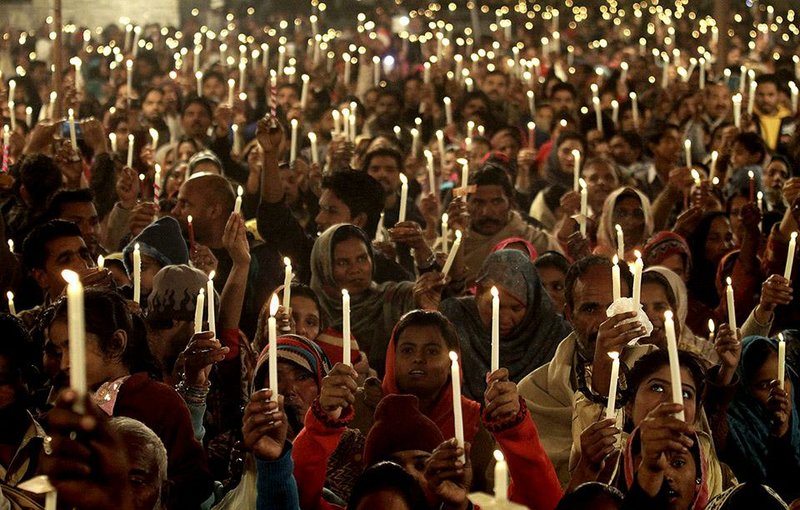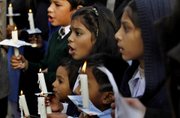PESHAWAR, Pakistan -- As they buried their children Wednesday, the families spoke of their dreams. One boy had just gotten high marks on his midterm and hoped to become a pilot. A 13-year-old wanted to become a doctor. Another just loved playing video games with his cousins.
At cemeteries across the Pakistani city of Peshawar, families lowered the rough wooden coffins of young boys and their teachers into the ground and gathered under funeral tents or at home, trying to comprehend the militant attack on a school that killed 148 people a day earlier, almost all of them young students.
The Pakistani government and military vowed a stepped-up campaign to root out militant strongholds in the country's tribal regions along the border with Afghanistan.
The head of the military flew to Kabul and sought help from the Afghan government -- with which Islamabad has long had a tense relationship -- in its hunt for the militant commanders behind the attack, a Pakistani military official said. He spoke on condition of anonymity because he was not authorized to talk to the press.
In downtown Peshawar, the family of slain 14-year-old Shyer Khan gathered to comfort his father, who was too overwhelmed by grief to talk.
Shyer's older brother, Muneeb, was in the school's auditorium Tuesday when gunmen began shooting randomly. He fell to the floor and pretended to be dead.
"There was so much bloodshed," Muneeb said softly. "I closed my eyes and lay on the floor for an hour."
When the militants moved on to other parts of the school, he escaped through a door. His younger brother was in a nearby classroom and was killed when the militants burst in and opened fire. At the gathering in the Khans' home, his family spoke of how Shyer was a fan of video games and teasing his sisters.
In Tuesday's attack on the military-run school, the militants first set fire to a car in a nearby neighborhood, likely as a diversion, residents said. Seven gunmen then scaled the school's brick fence. They headed into the building and up the stairs to the auditorium, where many students were gathered.
They broke open the doors, took to the stage and started firing indiscriminately, said military spokesman Maj. Gen. Asim Bajwa.
Bajwa said the military recovered about 100 bodies from the auditorium.
The Pakistani Taliban, which has waged an insurrection against the government for a decade, claimed responsibility. The group said it was seeking revenge for a military operation against the militants that began in June in North Waziristan.
Afghanistan has often accused Pakistan of tolerating or protecting Afghan Taliban and other militants on Pakistani soil as a way to pursue its interests in its neighbor and only trying to crack down on militants who attack Pakistani targets, like the Pakistani Taliban.
But in the wake of Tuesday's bloodshed, Prime Minister Nawaz Sharif vowed there will be no discrimination between "good or bad Taliban."
"We will continue this war until even a single terrorist is not left on our soil," he said.
Sharif lifted a ban on the death penalty for terrorist crimes, which has been in place since 2008. He met with military and civilian law enforcement officials to discuss the legal system's "inadequacies in punishing terrorists." Terrorism cases in Pakistan rarely end with convictions because of threats to judges and witnesses and poor investigations.
In Kabul, Pakistani army chief Raheel Sharif met with Afghan President Ashraf Ghani. He also met with Afghan and U.S. military officials and shared intelligence about the attack, the military said.
A Pakistani military official with knowledge of the meeting said Pakistan asked Afghanistan to take action against Mullah Fazlullah, the head of the Pakistani Taliban, who Pakistan has long said is hiding in Afghanistan's rugged border region.
Across Pakistan, stunned people held candlelight vigils in solidarity with the Peshawar victims.
In Peshawar, families were trying to cope with their grief. The army-run school was well respected in the city, and many parents sent their children there in hopes of a good education.
"My son was a brilliant student," Haji Dost Muhammad said. He spoke of the gold medal his son Asad received a few weeks ago for his midterm scores. The boy was shot in the back and killed, the family learned. He "wanted to be a pilot," his father said, "but his soul flew from his body before he could fly a plane."
Information for this article was contributed by Riaz Khan, Ishtiaq Mahsud, Asif Shahzad and Tim Sullivan of The Associated Press.
A Section on 12/18/2014


